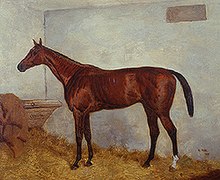Cremorne (horse)
| Cremorne | |
|---|---|

Cremorne in 1872. Painting by Harry Hall
|
|
| Sire | Parmesan |
| Grandsire | Sweetmeat |
| Dam | Rigolboche |
| Damsire | Rataplan |
| Sex | Stallion |
| Foaled | 1869 |
| Country | United Kingdom of Great Britain and Ireland |
| Colour | Bay |
| Breeder | Henry Savile |
| Owner | Henry Savile |
| Trainer | William Gilbert |
| Record | 19 won |
| Major wins | |
|
Woodcote Stakes (1871) Champagne Stakes (1871) Newmarket Stakes (1872) Epsom Derby (1872) Grand Prix de Paris (1872) Ascot Triennial Stakes (1872) Ascot Gold Cup (1873) Alexandra Plate (1873) |
|
Cremorne (1869–1883) was British Thoroughbred racehorse and sire. In a career that lasted from 1871 to 1873 he ran twenty-five times and won nineteen races. He was one of the leading British two-year-olds of 1870, when he won nine of his eleven starts. In the summer of 1872 he became the second of six horses to win both the Epsom Derby and the Grand Prix de Paris. At the end of the 1873 season, in which he won the Ascot Gold Cup, he was retired to stud, where he was moderately successful. He died in 1881. Cremorne was regarded by contemporary authorities as one of the best horses of his era in England.
Cremorne, described by The Field as "low, lengthy... wiry and muscular" horse with a strong and smooth action, was bred by his owner, Henry Savile at Rufford Abbey in Nottinghamshire. He was sired by Parmesan, a male-line descendant of the Byerley Turk. Parmesan won the Gold Vase at Royal Ascot and became a highly successful stallion siring, in addition to Cremorne, the 1871 Derby winner Favonius. Cremorne's dam, Rigolboche, was unraced. Savile sent the colt to his private trainer, William Gilbert at the Nunnery stable at Newmarket, Suffolk.
Cremorne was a difficult horse to train, owing to his extreme laziness: he was known to fall asleep during breaks in exercise. He also had an apparently insatiable appetite and would eat anything edible within his range. On one occasion he contracted a near-fatal bout of colic after eating all of his bedding straw.
Cremorne was one of the leading colts of his generation as a two-year-old, winning nine times. His wins included the Woodcote Stakes at Epsom, the Hurstbourne Stakes at Stockbridge, two races at Ascot (one of which was a "walk over" as no horse opposed him), the Chesterfield Stakes at Newmarket and the Champagne Stakes at Doncaster. By August he was being described as the "crack two-year-old of the season".
...
Wikipedia
